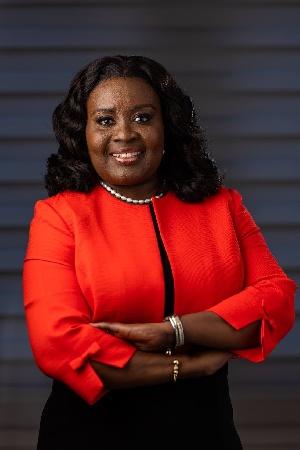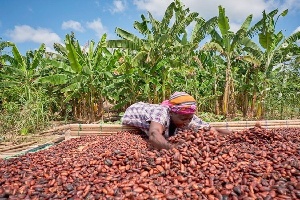- Home - News
- Elections 2024
- News Archive
- Crime & Punishment
- Politics
- Regional
- Editorial
- Health
- Ghanaians Abroad
- Tabloid
- Africa
- Religion
- Photo Archives
- Press Release
General News of Friday, 11 April 2025
Source: www.ghanawebbers.com
Trump tariff disparity with Côte d’Ivoire could hurt Ghana’s trade future says AGI President
The President of the Association of Ghana Industries (AGI) has issued a warning. He highlighted the long-term effects of a tariff gap between Ghana and Côte d’Ivoire. This follows the U.S. imposing a 10% duty on Ghanaian exports, including cocoa.
Dr. Humphrey Ayim-Darke spoke on PM Express Business Edition on Joy News. He cautioned policymakers against viewing this trade development in isolation. He urged for a coordinated regional response considering both countries' fiscal dynamics.
“We are concerned about the disparity between tariffs on Ghana and Ivory Coast,” he stated. He emphasized that both nations are working to harmonize cocoa exports for farmers' benefit. However, he noted that while Ghana faces a 10% tariff, Côte d’Ivoire's is 14%.
“What will be the impact on our trade?” he asked. Dr. Ayim-Darke warned that short-term relief decisions could backfire later. A seemingly beneficial 10% tariff might lead to future problems.
“When we think that we have a 10% [tariff], it is good for us—look, once today you are happy, the next time it will all catch up with you,” he cautioned.
He described the 90-day grace period before the U.S. tariff takes effect as “a window of opportunity.” This time allows for consultation and strategic planning with stakeholders.
“But for the 90-day pause, we would have been in higher anxiety,” he said. Currently, they are using this time to engage with government and counterparts.
Dr. Ayim-Darke stressed that Ghana must collaborate with Côte d’Ivoire to avoid losing international market competitiveness. “It will be useful if the country does some form of collective engagement,” he suggested.
He also outlined broader economic risks posed by the tariff to Ghana’s macroeconomic stability. “Are you worried about uncertainty and its impact on fiscal revenue? Oh yes,” he replied, noting it creates ripple effects.
Ghana’s fiscal space is narrow, with over 50% of government revenue coming from imports and exports. “Unfortunately, we know we had a cocoa drop due to galamsey activities,” he added.
Any disruptions in cocoa exports could hinder the government's ability to balance its budget and maintain stability. “The Finance Minister knows if he doesn’t get it right, balancing his books becomes tough.”
Dr. Ayim-Darke warned about indirect effects of the U.S. tariff on exchange rates and lending costs as well as remittances.
“If domestic build isn’t sufficient, more monetary policies will trigger higher lending rates,” he explained.
On remittances, he noted their importance in inflows for Ghanaian families: “If inflation hits the U.S., consumer disposable income drops.” This reduction affects how much remittances families receive and ultimately impacts government revenue.
In conclusion, Dr. Ayim-Darke's message was clear: Ghana must look beyond just the 10% U.S. tariff and act quickly to keep pace with its neighbors.
“You cannot look at this in isolation,” he said firmly. “It’s a macro and micro picture we must urgently address.”
Business










